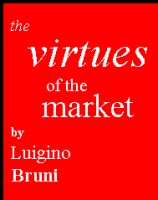Today, economy and market are dominated by the idea of fortune. One is successful because of personal charisma and favorable coincidences. Instead, the entrepreneur knows that hope is the motor of enterprise, because it creates relationships and determines certainty in the return on one’s talents.
Hope. The virtue that moves business in a season of crisis
By Luigino Bruni
Published in the weekly Vita on January 7, 2011
 Even if it may seem strange, hope is – or at least should be – a market virtue. As is well-known, hope is a virtue, and a particularly a theological virtue alongside faith and charity, as in Western and Christian tradition these virtues are the foundation for the others (courage, temperance, strength, prudence, etc.).
Even if it may seem strange, hope is – or at least should be – a market virtue. As is well-known, hope is a virtue, and a particularly a theological virtue alongside faith and charity, as in Western and Christian tradition these virtues are the foundation for the others (courage, temperance, strength, prudence, etc.).
For example, hope is one of the main virtues that an entrepreneur should have. The entrepreneur begins a business or a new economic activity if he hopes that tomorrow’s world will be altogether better than it is today, that the 100 invested today can become 101 or 105 tomorrow.
Whoever gives life to a business, not being just a short-term speculator, is like an old man who plants an oak tree. He knows that he is beginning something on the hope that its fruits will go beyond his own person or lifetime. Instead, without hope, it would be better to enjoy his resources or be a spectator. That is why hope is linked to trust (faith, fides), as without faith in life and in the future, one does not begin a business. And it’s understandable why entrepreneurs are optimistic, positive-thinkers, have a generous outlook on the world – all expressions of the virtue of hope.
Who makes me do it
The virtue of hope also shows its true colors in moments of crisis, of long stalemates, difficulties, slander, suspensions and betrayal. One who has given life to a business knows that the most important moments in its history are those in which he has been able to hope against all that is happening, against all his friends’ advice (“but who makes you do it?”, “you’re too naïve”, “don’t exaggerate”…), against the experts’ forecasts – when he has had the strength to hope, to insist on his project, to persevere in believing (faith) in his idea and in his Socratic “daemon”, walking for years on the crest of precipice.
Hope is therefore a virtue, and like every true virtue is always an alternative to fortune. The great Western culture arose in Greece (especially with Socrates) when it was discovered and affirmed that there existed a struggle between happiness and fortune. In the ancient world, happiness was linked to fortune. The Greek philosophers, in one of human history’s epochal moments, would understand that a new age was beginning for man. Man could be freed from the goddess of fortune, from fate, and begin to truly be responsible for his own destiny. The instrument of this liberation was precisely that virtue (arête, which means excellence, is the same root that we find in other words, like artist or acrobat), as only the virtuous man can become happy, even against bad fate.
Capable of excellence
The idea that arises in this extraordinary period of time in human history is that I am the main protagonist in my happiness (and unhappiness), and not events. Events are certainly important to my well-being, but they are never decisive in determining my quality of life, which instead depends on virtue, on my capacity to rise to excellence, which is in everyone in his or her own way. Virtue defeats fortune.
Market ethics, and especially entrepreneurial ethics, arise with the affirmation that innovation, responsibility and work – not fortune – are the protagonists of success in our work. That is why this culture of virtue must resist today in a world that underlines luck, lotteries, scratch and wins, games, the SuperEnalotta (its impressive to see the invasion of gambling games online, on TV, in soccer team sponsors, etc.).
Hope is a virtue because, with it, one doesn’t rely on fortune to bring returns on one’s investment and intelligence. Rather, one relies on his own virtues (excellence), on his collaborators, and on all the subjects of the market (we should never forget that the success of one entrepreneur also depends on the virtue of his suppliers, clients and even competitors – of the economic system as a whole). Hope is not fortune or luck then, but a virtue.
A social virtue
Finally, hope is an eminently social virtue. One hopes in people: in colleague Mario, in supplier Giovanna, in competitor Andrew. In fact, hope is never generic, given to unknown people or unpredictable events. Hope is a relational good; it´s an investment in a relationship, in many relationships. That is why hope, like all social virtues (fraternity, trust, reciprocity, brotherly love…) is fragile and vulnerable, because you can never control the other’s response. You can only “hope” in his reciprocity, without the guarantee of a contract. But, thinking it over well, vulnerability is the deepest condition of the human person. If economics is part of life, it should also know how to co-exist with vulnerability, aware that a good kind of vulnerability towards others hides many of the most beautiful things in life, like forgiveness, reconciliation, gratuitousness, a free encounter with others and not a hierarchical one, true esteem and recognition, sincere gratitude – all goods that people’s well-being depend upon. This goes for entrepreneurs as well. They produce well-being (and not only wealth) when they’re capable of virtue, of relational excellence. They are cultivators of hope.






